Reading is one of the most important skills any one of us will ever learn. It is the foundation for learning in any and every subject. Because of this, it is important to foster a love of reading early on that makes children eager to read as they grow older. Using fun, interactive activities like those listed in this article will set the stage for children to be successful in reading for years to come!
1. Create a Shopping List
Have kids help you create a shopping list. After, read each word aloud and have them practice the reading skill of letter and sound recognition.
Learn More: Teacher Vision
2. Use Puppets
Research shows that to teach a child to read, we should give the child opportunities to retell stories as much as possible. In this activity, tell a story using a puppet, and then you can have kids retell the story using the same puppet!
Learn More: Amazon
3. Have a Preschool Pen Pal
This fun letter activity will get all kids interested in both reading and writing. They will look forward to hearing from their pen pals and reading how their lives are going before writing their own letter in response.
Learn More: Primary Playground
4. Play with Magnetic Letters
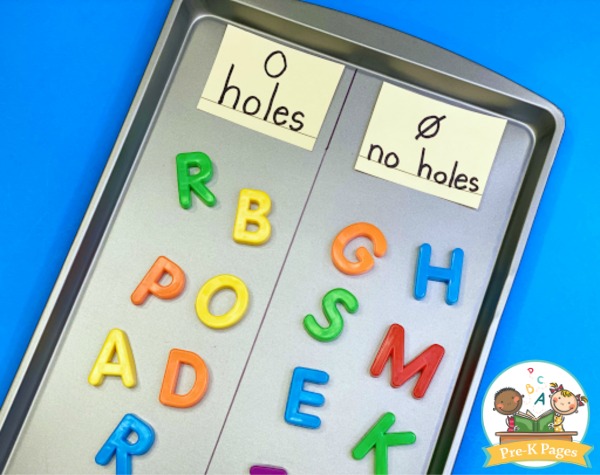
Use alphabet letter magnets to teach letter recognition. This simple activity has children put all of the letters with holes on one side and the ones without holes on the other. This helps teach them the different letter shapes. After, you can go over each letter sound.
Learn More: Pre-K Pages
5. Play Doctor
Setting up a doctor’s play area is great for use during choice time! Children can even help you create the signs for the different things included in your doctor’s play area, solidifying letter knowledge. If you have extra space, you can also make other fun play areas!
Learn More: PreKinders
6. Match Letters to Sounds
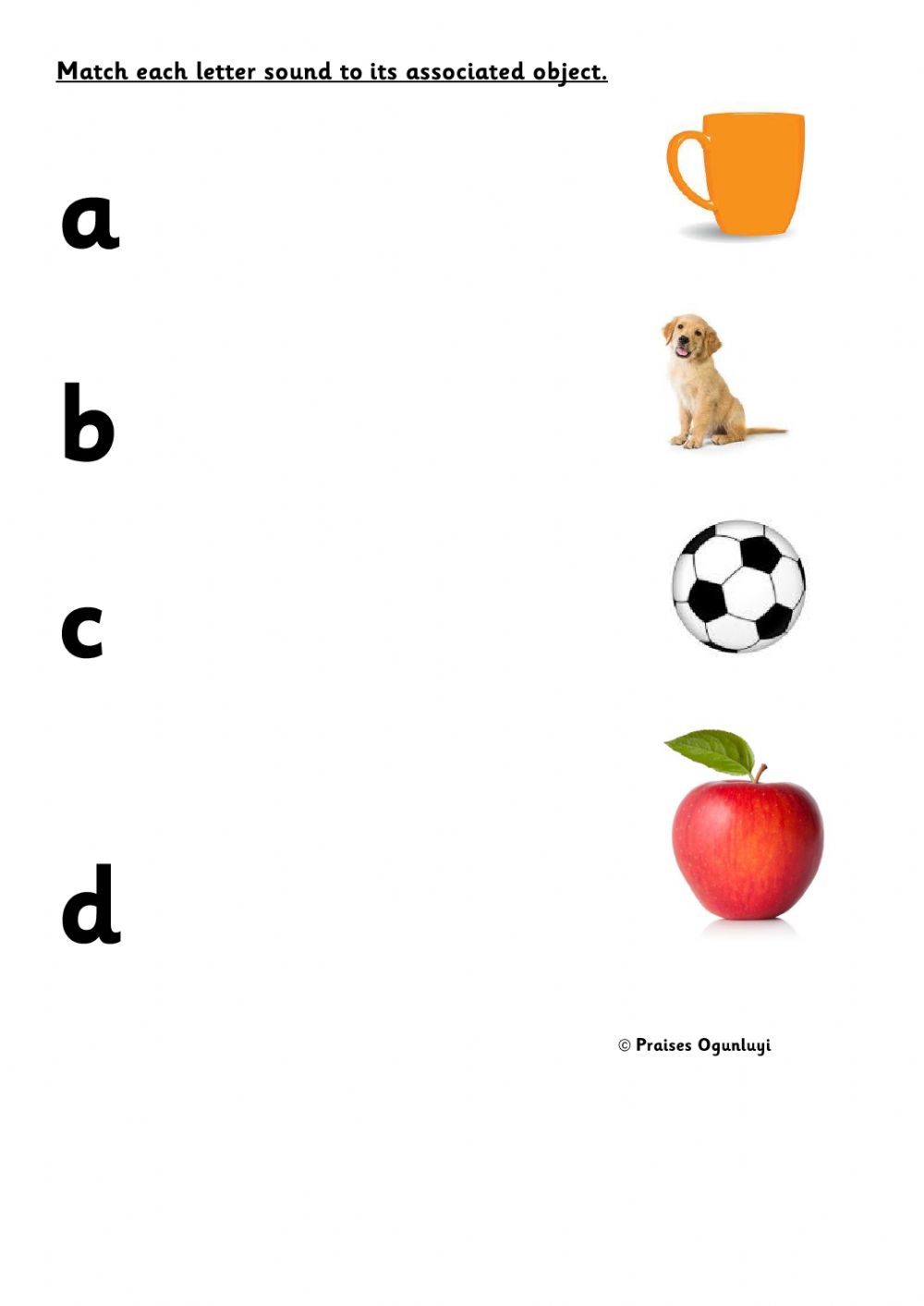
Teach letter sounds with worksheets that have children match letters to the image that begins with the correct sound. This is also a good way to teach the difference between lowercase and capital letters by using worksheets with both.
Learn More: Live Worksheets
7. Label Common Items
If you label common items around your home with their names, you can have children practicing early literacy from their baby to preschool years. They will constantly see the written words of common images, giving them a head start on letter recognition!
Learn More: 1 Plus 1 Plus 1 Equals 1
8. Play I Spy
One of the easiest activities for children that requires zero setups is I Spy! You can play by having them find items that start with a certain letter, or you can have them find the letters in words in your everyday world. Soon they will be “spying” all of the letters they see on billboards, cereal boxes…anything they come into contact with!
Learn More: Homeschool Preschool
9. Join a Preschool Book Club
If you live in a bigger area, you may be able to find a local preschool book club. If not, you can subscribe to various different book clubs for children online. Your children will be excited to see what book will show up next, which will get them excited about reading!
Learn More: Homegrown Friends
10. Do a Letter Scavenger Hunt
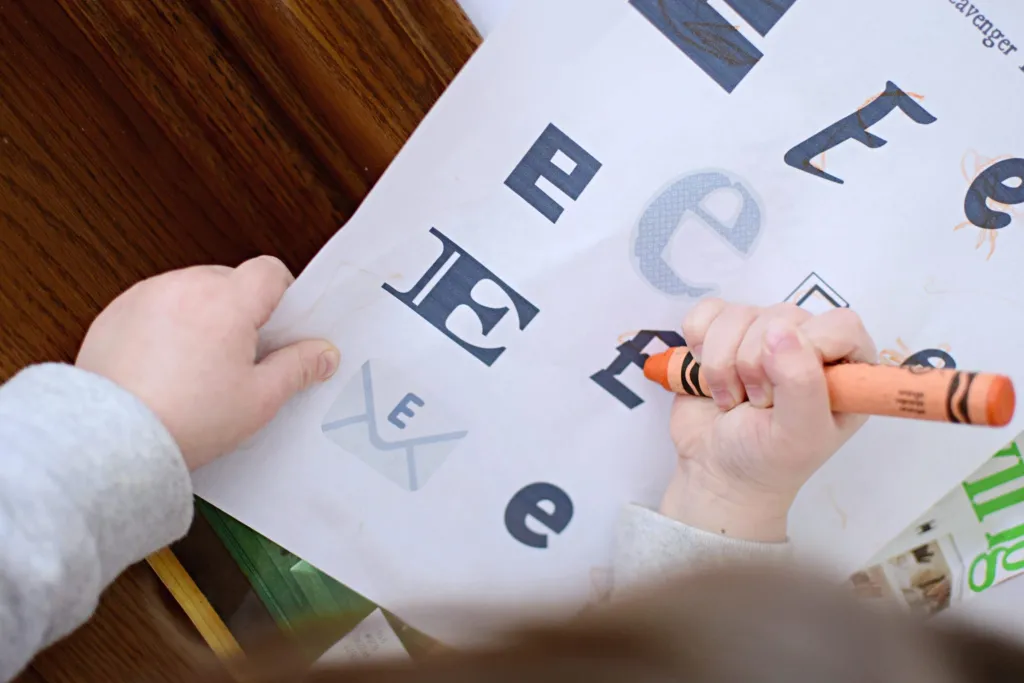
Do a scavenger hunt and find things that start with all of the letters of the alphabet in your area. You can do this in your home or on a walk. Your kids will be learning while having fun! Children can either find items beginning with the focus letters or actually find the letters in print form.
Learn More: Entertain Your Toddler
11. Play Board Games
There are a number of board games that are made specifically with literacy in mind. Play these games to practice their oral literacy. One way to play the game pictured is to create a story together, with each person adding to the story based on the picture on their game piece.
Learn More: 40 Best Board Games for Preschoolers
12. Play a Sight Word Game
The great thing about games is that children learn without even realizing it! Help your child practice those sight words now to make reading easier later. They will be excited to see what “prize” they get for every answer they get right.
Learn More: SandZ Academy
13. Read Rhyming Books
There are three stages to rhyming: hearing a rhyme, identifying a rhyme, and producing a rhyme. To introduce rhyming, read rhyming books for kids. Once they understand the concept, ask them to identify rhymes while you are reading. Finally, have them expand on the rhymes by creating their own. Soon your kids will be rhyming masters!
Learn More: Early Learning Ideas
14. Watch Nursery Rhyme Videos
Who doesn’t remember nursery rhymes from their childhood? Nowadays, kids can access cartoons and videos with nursery rhymes easily using YouTube. Soon they will be dancing around singing these catchy tunes in their everyday lives. They will be practicing early literacy skills without even realizing it!
Learn More: Farmees – Nursery Rhymes And Kids Songs
15. Start a Home or Classroom Library
Fill up a child-sized reading corner with their favorite books, award-winning books, alphabet books…any and all books you can get your hands on that will pique their interest in reading! Have them pick a few books to read each night before bed and foster a love of reading early on.
Learn More: National Association for the Education of Young Children
16. Read Wordless Picture Books
Read a picture book without any words. This allows your children to use their imaginations to make up their own storyline as they read. You can read the same book multiple times and come up with a different story every time!
Learn More: 30 Classic Picture Books for Preschool
17. Play A Fun Phonics Game
Learning phonics is an important language skill to better understand letter sounds and the relationship letters have to one another. By playing phonics games, your kids will have so much fun, that they will forget they are learning.
Learn More: 25 Fantastic Phonics Activities for Kids
18. Act Out Stories
After children read and know stories well, have them act them out. This will build on the literacy skills of recall and comprehension at the same time. And you will get to see their creativity as they act out their favorite stories!
Learn More: High Scope US
19. Make Real-World Connections
As you read to your children, make real-world connections by asking leading questions like “how would you feel if this happened to you?” or “have you ever been to a park like this?” This helps them make an association between books and the real world.
Learn More: Teach Stone
20. Tell Family Stories

Telling stories about your family to your child helps them feel connected to something bigger and also find their place in the world. When they are ready, they can tell their own stories of fun things you have done together to practice their recall skills!
Learn More: Leadership Storylab
21. Have Them Repeat Directions
Having your child repeat back directions you have given him or her does two things: 1. It makes sure they know what is understood of them, and 2. It helps build and practice their oral vocabulary and recall skills. And this way they can’t claim they didn’t hear you when you asked them to do something!
Learn More: Child Mind
22. Create a Storybook
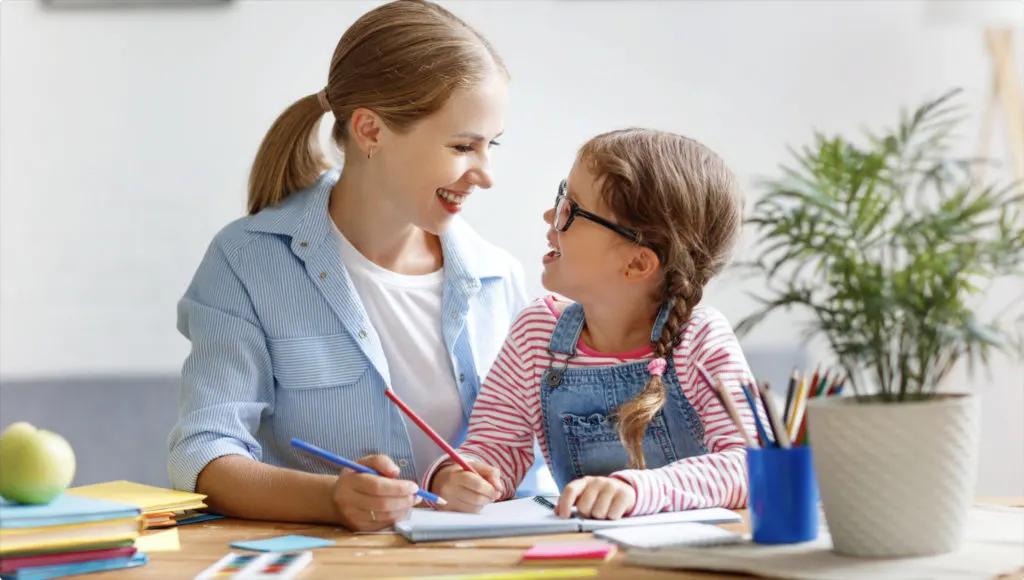
Have your child dictate a story as you write it on the pages of a blank book, and then have them add illustrations to practice their fine motor skills. They will practice many literacy skills at once and be excited to add their book to the bookshelf.
Learn More: Kinder Art
23. Practice Sight Words with Magnetic Letters
Using a whiteboard and magnetic alphabet numbers, have children match the magnets to words you have written out. As they get older, you can add additional vocabulary words to this fun game. You can also messages written in magnetic letters on your fridge to further encourage literacy development.
Learn More: Fun Learning for Kids
24. Create a Menu
Involve your child in your weekly meal planning by having them create their own menu. You can give them a list of options and they can copy down which they would like that week. They will be practicing their reading and writing skills while feeling involved with family planning!
Learn More: Primary Treasure Chest
25. Make Bath Time Fun Time
Use foam letters on your shower wall to turn bath time into learning time. They will have fun manipulating the letters to create new words! This is an easy, no cleanup activity that they can play every time they are getting clean.
Learn More: Munchkin
26. Create Alphabet Letter Shapes
Use alphabet cookie cutters and playdough for a fun hands-on activity for preschoolers. After they have created enough letters, have them put them together to make words. You can also do this game with cookie dough and make edible letters!
Learn More: Doughnique
27. Make Alphabet Jewelry
Using string or pipe cleaners and alphabet beads, have children create jewelry. You can link this to books you have recently read and have them spell out words related to the story.
Learn More: Preschool Inspirations
28. Create the Alphabet with Blocks
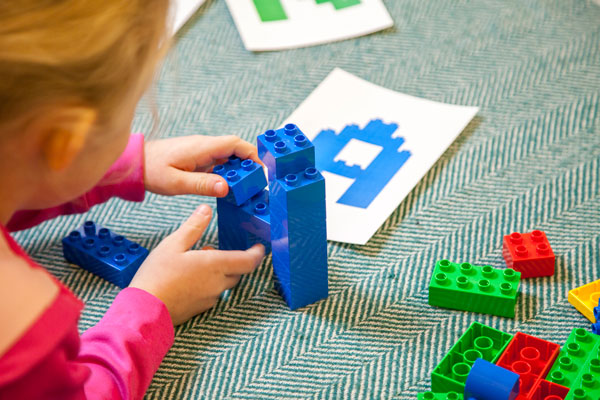
Using printouts of letters and building blocks, have children literally build the letters of the alphabet. Soon they will be alphabet masters and ready to take on reading on their own!
Learn More: All About Learning Press
29. Write with Marshmallows
This activity is great for letter recognition and for teaching children to spell their names. After writing their names on paper, give them some glue and marshmallows and have them create their own marshmallow art. And hey, when they are done, they can even eat a few marshmallows!
Learn More: HiMama Child Care App
30. Create a Rhyming Anchor Chart
Anchor charts are great reminders for all kids and help visual learners really cement new concepts. Create a rhyming anchor chart to solidify the concept of rhyming using words and pictures. After, read books with rhymes and ask the children to point out when you rhyme two words.
Learn More: Teachers Pay Teachers
31. Sandpaper Letter Tracing
Sandpaper letter tracing not only prepares your students for writing, but for letter recognition! This activity allows your children to practice their fine motor skills, and letter shapes and can be extended to any reading level. Children can move from writing and reading the letters to CVC words and more!
Learn More: How We Montessori
32. Nomenclatures
Nomenclatures have originated from the Montessori method that prepares your preschoolers for reading. This pre-reading skill allows students to match pictures to words and words to words, allowing them to develop their letter and reading skills by the way the words look, and also learn the vocabulary at the same time!
Learn More: Google
33. Beginning Sound Picture Matching
Beginning sound picture matching is the ideal reading activity for any preschooler. This activity for preschoolers allows students to say the word and identify the beginning sound of each letter. That is a great way to practice letter sounds and recognition.
Learn More: Pinterest
34. Letter Scavenger Hunts
Preschoolers need to learn the names of the letters and the sound of each letter. This scavenger hunt allows preschoolers to be active and explore, while they are engaged in this alphabet hunt. This activity can be adjusted for any reading level and can be used for finding things that begin with each letter as well!
Learn More: The Many Little Joys
35. Clue Game
The clue game is an excellent way to teach your preschooler letter sounds. Fill a basket with random items that start with different letters. Then begin to say, “I’m thinking of an object! It starts with the letter/sound….” Then your child can use their literacy skills to find the object that you are thinking of!
Learn More: Bright Little Owl
36. Reading, Reading, and Re-Reading
Bob’s Book Series are the perfect books for preschoolers that a recommended by teachers. These decodable books have various levels and begin by introducing CVC words. Your preschooler will feel accomplished the moment they finish this book, as they learn how to blend letters and read on their own!
Learn More: Amazon
37. Story Sequencing Cards

Sequencing is a crucial reading skill, but it can be difficult to learn. To prepare your preschooler for reading, use story sequencing cards from their favorite books. this will keep them engaged and show them concepts of first, before, and after. These cards can have words, or only pictures depending on your preschooler’s literacy level. Either way, your child can develop their narrative skills with this fun activity.
Learn More: Lakeshore Learning
38. Sight Word Jumping
If you are looking to get your child moving while reading, then use sight word jumping! All you need is some chalk and a place to write! Sight words prepare each child for reading and this gross motor game will make learning even more fun!
Learn More: Fun Learning for Kids
39. Moveable Alphabet
The moveable alphabet is similar to magnetic letters, yet they are put on the floor. Students can begin this activity by looking at an object and trying to spell it based on their letter knowledge. After they have mastered object spelling, they can do picture spelling, and then spell words of their choice! This Montessori activity is teacher recommended and can be integrated into almost any activity.
Learn More: The Prepared Nest
40. I Spy
There are thousands of beginning sounds activity, but your preschoolers will love to learn about them in this special version of I Spy. This fun game gets kids up and moving while practicing their letter sounds, letter names, and other pre-reading skills.
Learn More: Fun Early Learning
41. Story Bags!
Story bags are the ultimate way to improve your preschooler’s narrative skills! These child-led stories give your child opportunities to create their own story based on their own imagination from what is in the bin! Perfect for circle time or an aftercare activity, your preschoolers will never stop learning!
Learn More: Teaching English
42. Match the Rhymes!
If your preschooler hasn’t started to read yet, that doesn’t mean you can’t teach about rhymes and phonemic awareness. Pull together some objects that rhyme and put them in a box. Have them practice their vocabulary and literacy skills by finding the objects that rhyme!
Learn More: YouTube
43. Bingo!
Bingo is the perfect activity to increase student vocabulary and reading skills. Students have to read each card and find the picture on their bingo cards. Once you start, they won’t want to stop!
Learn More: Amazon
44. Alphabet Box
If you are looking to practice your child’s beginning sound skills, then prepare an alphabet box! Place a letter in each box and have the children sort small objects based on their beginning or ending sounds!
Learn More: How we Montessori
45. Picture Word Matching
Picture word matching is a Montessori recommended activity that helps preschoolers match CVC words while expanding their vocabulary. The pink set is the first level, but advanced readers can move on to the blue level.
Learn More: Montessori Equipment
46. Letter Treasure Hunt
If you are looking for a hands-on learning activity, then try the letter treasure hunt! This sensory activity will prepare your child, for reading as they have to dig and identify letters as they find them!
Learn More: Mama of Joy Sensory Play
47. Create a Story
If you are looking to practice your preschooler’s writing and reading skills, have them create their own story with a dice! Not only will they have to use their imagination, but they will be able to narrate and practice story-telling!
Learn More: 123 Home School 4 Me
48. Write the Room!
If you are looking to get your preschoolers moving around the room while practicing the alphabet, then try this write the room! Students will practice their writing and letter recognition skills and have fun at the same time!
Learn More: Teachers pay teachers
49. Nursery Rhymes and Fingerplays
Preschoolers love story time, but some may find it hard to focus. Help them stay engaged by using nursery rhymes, finger plays, or puppets as you read! These are perfect for students from the baby to the preschool years.
Learn More: Empowered Parents
50. Magical Alphabet Letters
Magical Alphabet Letters is an excellent alphabet activity that can help your preschoolers with their letter recognition. Kids won’t believe their eyes as the letters appear on each blank paper!
Learn More: No Time for Flash Cards
51. Vowel Tree!
If your preschooler has mastered the letter sounds and names, they may be ready for the vowel tree! This activity is recommended by teachers for teaching short and long vowel sounds. Gather a bunch of letters and place two consonants on each side of the letter in the tree. Then read to see how we distinguish each vowel.
Learn More: Facebook
52. Letter Slap
Letter slap is an awesome activity for preschoolers to learn their letter sounds and names. Call out a letter and have your child slap the letter! This letter activity will have your preschoolers super excited about learning!
Learn More: Fun Learning For Kids
53. Sight Word Chalk
Sight word chalk is an excellent activity for practicing word and letter recognition. Students can either write the words, or match their sight word cards to each bubble!
Learn More: The Educators Spin on it
54. Alphabet Chalk
If you are looking for a pre-reading activity that gets your preschooler outside, then do alphabet chalk! There are so many variations of this game, but you can have them fill in the missing letters, hop to each one and say them, and more! This is the perfect child activity to practice letter recognition, letter names, and writing skills.
Learn More: Buggy and Buddy
55. Roll and Read
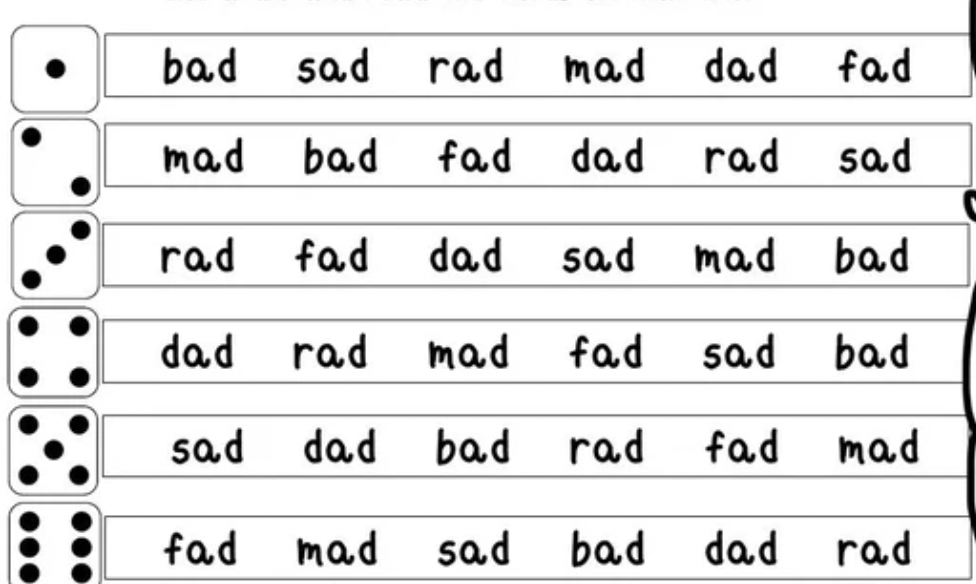
If you are looking for a fun independent reading activity, try roll and read! All you need is a dice and a roll and read the printout. Preschoolers can practice various reading skills like identifying word families, long and short vowels, and consonant digraphs through this hands-on activity.
Learn More: Etsy
56. Letter Matching Push
Identifying uppercase letters and lowercase letters can be a difficult task for young readers. Create your own letter matching game to develop these abilities as well as their fine motor skills. You can use cereal boxes, cardboard, or anything else that you can punch a hole into.
Learn More: School Time Snippets
57. Word Family Sliders
If you child is ready to start reading, then prepare some word family hats! This reading skill is essential for preschoolers and easy to make! Slide down a consonant, say the sound and then the sound of the word family and you’re good to go!
Learn More: Make take teach
58. Charades
Charades is one of the best activities for preschoolers learning to read. Not only will they be able to identify different actions and practice their body awareness, but they will be able to see how each word is spelled as they look at the picture while building their vocabulary.
Learn More: Twinkl
59. Car Letter Blending
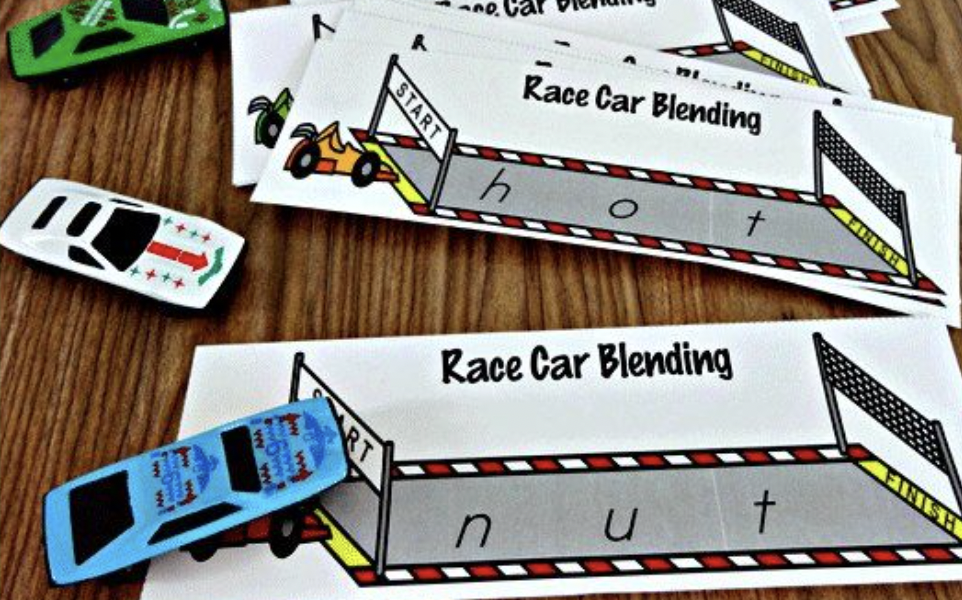
If your child demonstrates knowledge of letter sounds, then they should be ready to learn about blending and forming words. Preschool teachers recommend this fun car letter blending activity to show preschooler’s that each letter has its own sound in a word!
Learn More: Teachers Pay Teachers
60. Decodable Books
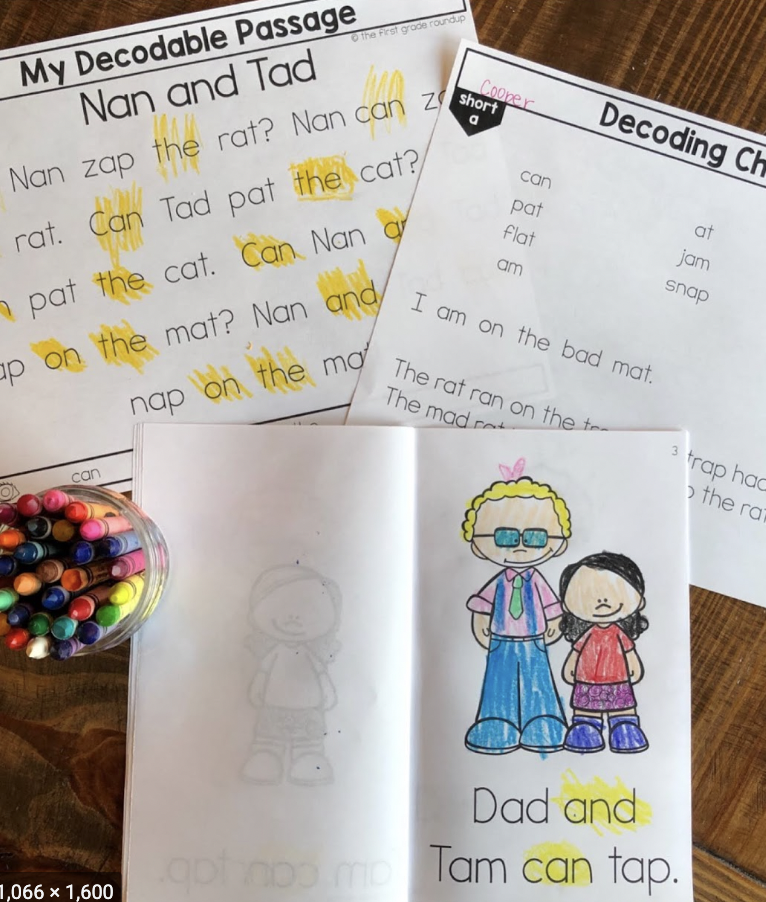
Decodable books are perfect for children that are learning to read. Students can identify word families, and then apply their knowledge as they read the story! This type of story gives children the opportunity to take charge of their learning.
Learn More: Reading A-Z